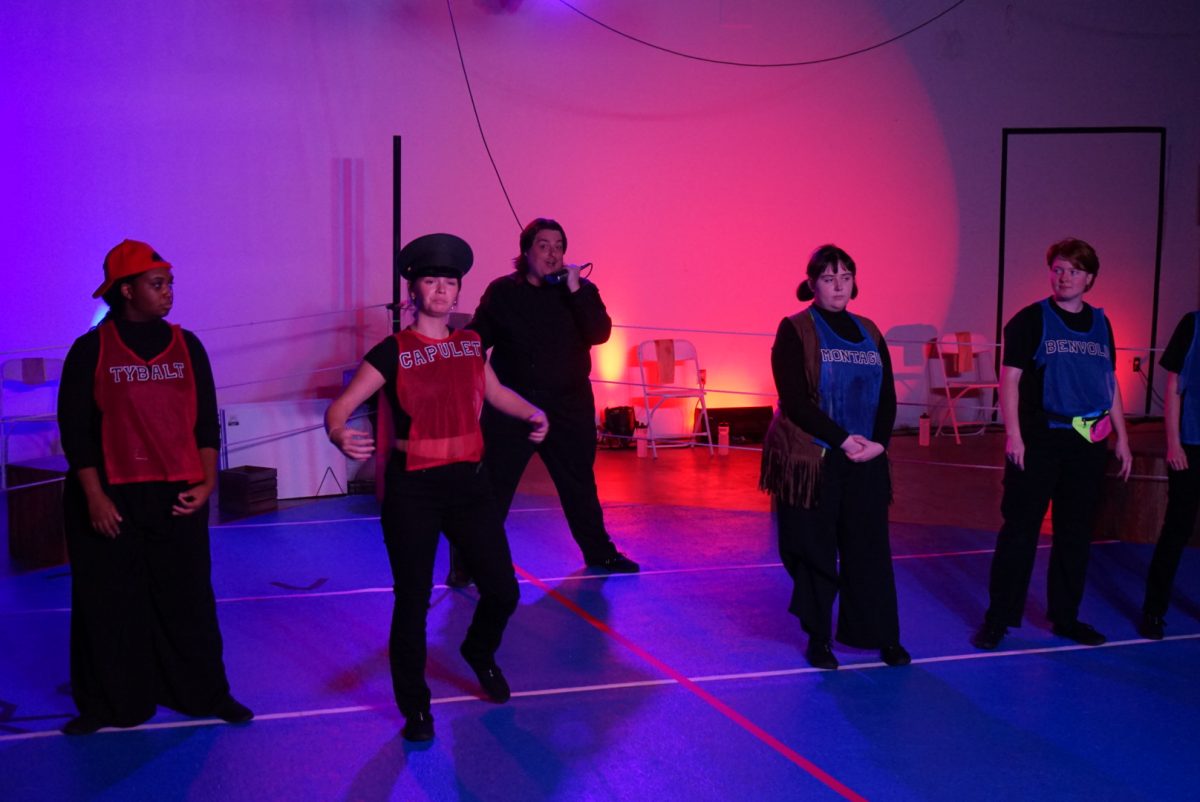The “Romeo vs. Juliet: Grudge Match” production, directed by Professor Robert Fuson, encouraged audience participation across all five shows. This unique show challenged modern-day theater etiquette, was performed almost entirely through improv and set a new standard for the stakes at which the art can be appreciated.
The cast and crew have been working towards the show since the first week of classes this semester. Officially, the first table read was held on Aug. 27, and rehearsals began shortly after.
Initially, Director Fuson gave the cast the tools they needed to study both theatre technique and the philosophy on the effectiveness of improv. Jarrod Stocks, who played the role of the Announcer, gave accolades to Fuson, saying how this allowed the cast members to “handcraft” and “handpick” what they needed to do to make the show successful.
Apart from some references to Shakespeare’s original “Romeo and Juliet,” two monologues reserved for Mercutio and Juliet, and Stock’s dialogue as the Announcer, the production was entirely improvised. In order to prepare for this, the actors were encouraged to act out the most extreme scenarios during rehearsal.
Opening night was on Thursday, Oct. 10, the day after the department preview. Director Fuson was proud of how well the actors handled the audience and looked forward to the next couple of nights.
What made this production so special was both the type of casting and the role the audience played throughout the show. Stocks maintained the only static character with his role as The Announcer, which means his role never changed across the various nights.
However, the other cast members studied and perfected various roles, as they were not aware as to which character they would play until directly before that particular show. In front of the audience, each cast member drew wiffle ball-like objects out of a box that determined the fate of which character they would have to take on that night.
In order to do this effectively, each member of the cast had to memorize and learn each character’s persona and actions well enough to be able to respond accordingly.
Now, the most unique element of the show was that the audience led the entire trajectory of the show each night. In fact, the audience was divided into the Montagues and the Capulets, much like sporting events audiences are divided to cheer for two separate teams.
The first round of the show consisted of a game of trivia. The audience was responsible for helping their character answer questions specific to Florence, and the first team to answer five correctly determined died that round
Following this was the wrestling round. The audience was able to discuss with their specific partner what move they believed would win against their opponent, and it unfolded like a game of rock paper scissors. The first character to win two times ultimately killed the other.
There was a round surrounding a civil court, where the actors had to improvise based on the audience’s suggestions as to why the families were fighting.
The next round consisted entirely of improv scenarios, where they included members from the audience.
The last round consulted social media, with each team having selected a specific representative. The winner of this round was determined by an Instagram poll, and they got to choose the final character to die.
As a result of how this production was set up, the characters had to effectively respond and act based on the audience’s decisions.
“The audience is an essential part of the production, so it’s a very high-risk, high-reward situation,” said Stocks. “If you have one audience member that’s just not jiving with it, it becomes a much harder task to get the show to where it needs to be.”
In theory, this would have posed some difficulty if audiences were not the most participatory, but the cast did a stellar job at shaping and adjusting their performances each night.
“There wasn’t a night where we had any bad performances as actors,” said Stocks. “It was running like clockwork pretty much every time we got up there.”
Director Fuson’s inspiration for this production came from his master’s research into the evolving role of the audience, post-streaming era of entertainment. He came into the experience realizing that he had to produce a show that would be different for every performance and create one where the audience felt they could contribute as collaborative storytellers.
Although the audiences varied each show, each crowd had moments that made each night a unique experience. For example, on one of the nights, a member of the audience had a well-timed objection during the civil court dispute when it was blamed on a man named “Dan.” He objected to this claim, stating that Dans were generally as good people as Dan himself, causing the audience to erupt in laughter. Immediately, Dan was now a part of the actual production, granting this audience a personalized experience.
The variation in audiences allowed the cast to fully grasp Director Fuson’s intentions of challenging audience participation in theatre.
“It was successful in that we introduced all these audiences to different possibilities for what theatre can do and be,” said Fuson. “Our cultural concept of what theater is in need of challenging, and my actors managed to walk away with a much broader understanding of what it means to involve an audience in the production.”










